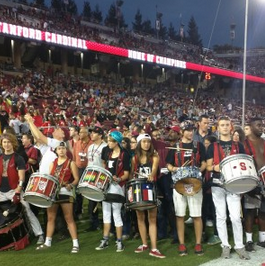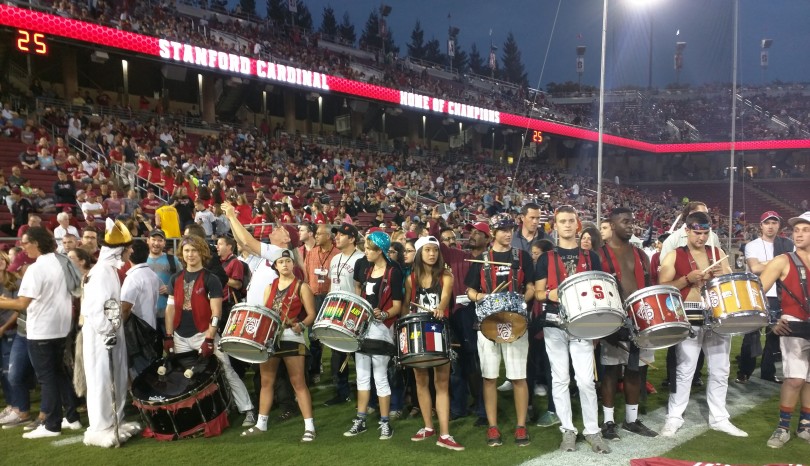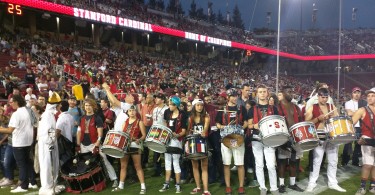aNewDomain — Rick Reilly wrote a memorable column way back in 1995 for Sports Illustrated. In it, he described all the ways college football is better than professional football.
In that SI piece, Reilly listed dozens of treasured college football traditions. Those traditions, he correctly asserts, are the heart of what makes college football better than the NFL. He referenced such traditions as “War Eagle,” yell practice, point push-ups and dotting the i at Ohio State — the latter is accomplished by a tuba player during the marching band’s performance. He also mentions LSU’s Tiger Stadium, which fans call Death Valley.
But some college football traditions are becoming endangered, a development that’s bound to put them all at risk. If you want an example of this, just look at what’s going to happen at the upcoming LSU-Texas A&M game. LSU, it’s been revealed, isn’t going to let the Aggies’ marching band play. What a mistake.
Now it may be a #FirstWorldProblem, but LSU is just the latest example of schools who won’t extend an invitation for the visiting team to bring its band to play at halftime. Almost as bad, in a trend that’s becoming all too common, is charging the visiting band for the cost of the seats. Sports Illustrated called out Texas for charging $100 per band member for the visiting Texas Tech Red Raider Band to attend the game vs. Texas this year.
But traditions matter. Look at this short SEC Network promo for the Aggies’ first game this year.
Perhaps there is no play more famous than the ending of the Stanford-Cal Game in 1982. And it ended with “The Play.” Remember? Check out this rare footage.
Now, as everyone knows, that famous play was affected by the presence of the Stanford Band visiting California’s Memorial Stadium in Berkeley, CA.
Memories like this make Texas’ charging competing teams’ bands for seats and LSU’s lack of band invitations particularly poignant.
It’s true that Texas was quick to counter the PR maelstrom around forcing band members to buy game tickets. It pointed out that it had gifted 300 tickets to both Rice and Cal for games in Austin, which would allow those bands to attend. As for charging the Tech band for seats, the message was just “everyone else in the conference is doing it” and “they started it.”
At least Tech has an invite to attend and perform. Even if no one is making its attendance easy.
LSU isn’t even offering that courtesy to the Texas A&M marching band, which you saw in the SEC Network promo I included above. LSU is not giving The Aggie Band a block of time to perform at halftime at the LSU vs. Texas A&M game on Nov. 28, 2015.
Why would LSU do this? Is it inviting other bands? Is it just sour grapes over losing its defensive coordinator to the Aggies in the offseason?
Nope and nope.
The reason, says LSU, is that it wants to bring in a professional performer for a SuperBowlish halftime show.
To be fair, LSU isn’t the only one choosing glitz over treasured tradition.
Arkansas similarly denied the Texas A&M band, which is the largest military precision marching band in the United States, from performing in Fayetteville two years ago. Why? It cited an awards ceremony for Arkansas donors that would span the 20 minutes.
Now this is America, and the athletic directors and programmers at such universities are within their rights to do this. They can block visiting fans from buying many tickets and the visiting band from coming and performing at halftime.
But to lock marching bands out of your halftime is just plain rude.
Worse, it takes away from the spirit of the game.
Maybe I am naive. Or maybe I’m just longing for yesteryear and times when cordial sportsmanship was the rule. By tradition, the visiting band always plays first at halftime. A nod and a bow. A handshake at the end of the game. You may not like your opponent, but you show them respect out of respect for the game.
Everyone wants to win. It is just sad to see the traditions being degraded on the path to self promotion. Read the 1995 article and ask yourself if not inviting a band to attend a high profile spirited match between rival schools is what makes college football great.
The incidents I mention are ones I am aware of as a member and former member of actual university marching bands. And I am sure there are other such incidents and manipulations done at other schools in other conferences under different circumstances.
It just makes me feel like it is the fans that are short-changed and missing out on a valuable and rich part of what makes the experience great. And the social media storm over charging the visiting band admission is a sign that when people are aware of these actions, they can and will express disappointment publicly.
The ADs do not decide to do things like this in a vacuum. They do it because nobody calls them on it. And I want to call them out and say that this blows. If the SEC is serious about valuing traditions and pageantry, they will do something about it.
Sure there are debates, an upcoming presidential election next year, several migration crises, Chinese economic instability and very serious things happening in the world. On that scale, these sorts of slights and loss of old traditions are minor issues. But my guess is some people out there do care. Even about the little things.
For aNewDomain, I’m Richard Hay.
Full disclosure: I was a performing member of the Fightin’ Texas Aggie Band from 1989 – 1993 and in the Leeland Stanford Jr University Marching Band (lsjumb) in 2014 and 2015. I am working on 50 halftimes performed lifetime (currently at 47). Arizona, UCLA, Oregon and I will check out with my 50 after this season.















